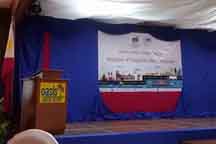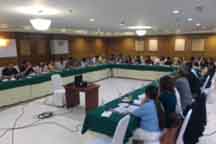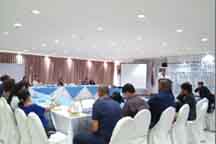Relevant government agencies have concurred to the urgency of the Philippine accession to the Istanbul Convention which will implement the ATA Carnet System.
The ATA Carnet is an international scheme that will allow tax-free and duty-free importation of commercial samples, professional equipment and articles for presentation or use in trade fairs, shows, exhibitions without customs formalities. It will also allow traders to use Carnet, a single document of goods that will pass through several customs territories and will be valid up to one (1) year. Hence, traders will save costs and time in clearing goods at the border.
Relevant agencies such as the Department of Trade and Industry (DTI) and Department of Finance (DOF) are urged to submit their respective Certificates of Concurrence (COC) to the Department of Foreign Affairs (DFA) by December 2017.
The DFA – United Nations and International Organizations (UNIO) leads in the preparation of the Instrument of Accession for the President’s approval. Director Roberto Manalo of the DFA-UNIO who serves as the chair of the technical working group on ATA Carnet, underscored the need for government agencies to support the promotion of export development through the ATA Carnet system.
He added that this is also in compliance to the Office of the President Memorandum Circular No. 27 issued last 6 October 2017 which directs government agencies to “strengthen the implementation of the Philippine Export Development Plan (PEDP).” –Asnia R. Bayabao

 Logistics Efficiency Indicators (LEI) Assessment Project was launched by The Department of Trade and Industry’s Competitiveness Bureau, in partnership with the World Bank-International Finance Corporation (WB-IFC), the Board of Investments (BOI) and the Export Development Council (EDC).
Logistics Efficiency Indicators (LEI) Assessment Project was launched by The Department of Trade and Industry’s Competitiveness Bureau, in partnership with the World Bank-International Finance Corporation (WB-IFC), the Board of Investments (BOI) and the Export Development Council (EDC). The exporters underscored the need to increase government budget to finance exporters’ participation in international trade fairs and have bigger and more presentable Philippine booths to be at par with exporters of other ASEAN countries.
The exporters underscored the need to increase government budget to finance exporters’ participation in international trade fairs and have bigger and more presentable Philippine booths to be at par with exporters of other ASEAN countries. These inputs were gathered during the recent Focus Group Discussions (FGD) for the PEDP 2018-2022 in Cebu and Davao attended by various sectors from handicraft, shell, agrimarine products, food, banana, cacao, furniture, lifestyle products and activated carbon. The next FGD will be conducted with the services sector specifically IT-BPM, audiovisual, animation, franchising and retailing and tourism and travel-related services. –
These inputs were gathered during the recent Focus Group Discussions (FGD) for the PEDP 2018-2022 in Cebu and Davao attended by various sectors from handicraft, shell, agrimarine products, food, banana, cacao, furniture, lifestyle products and activated carbon. The next FGD will be conducted with the services sector specifically IT-BPM, audiovisual, animation, franchising and retailing and tourism and travel-related services. –